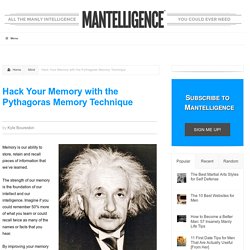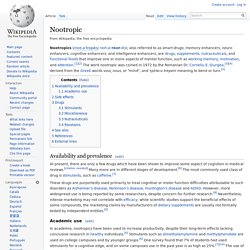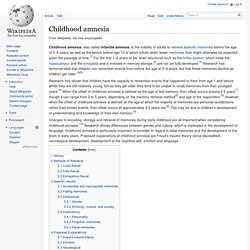

Hack Your Memory with the Pythagoras Memory Technique. Memory is our ability to store, retain and recall pieces of information that we’ve learned.

The strength of our memory is the foundation of our intellect and our intelligence. Imagine if you could remember 50% more of what you learn or could recall twice as many of the names or facts that you hear. By improving your memory you improve the rate at which you’re able to learn and retain information. Memory building is one of the most important and overlooked components of building your intelligence. I place an extremely high value on memory. In my memory improvement quest, I stumbled across one of the most powerful techniques out there. I normally wouldn’t tell my readers about something I’ve been using for such a short amount of time, but since my results from using the technique have been so incredible, I feel I have to. The best part is that the technique is that it’s easy and takes only five minutes each day. I assume that the name Pythagoras is ringing a few bells for you?
In Conclusion. Nootropic. Nootropics (/noʊ.əˈtrɒpɨks/ noh-ə-TROP-iks), also referred to as smart drugs, memory enhancers, neuro enhancers, cognitive enhancers, and intelligence enhancers, are drugs, supplements, nutraceuticals, and functional foods that improve one or more aspects of mental function, such as working memory, motivation, and attention.[1][2] The word nootropic was coined in 1972 by the Romanian Dr.

Corneliu E. Giurgea,[3][4] derived from the Greek words νους nous, or "mind", and τρέπειν trepein meaning to bend or turn.[5] Availability and prevalence[edit] At present, there are only a few drugs which have been shown to improve some aspect of cognition in medical reviews. [citation needed] Many more are in different stages of development.[6] The most commonly used class of drug is stimulants, such as caffeine.[7] Academic use[edit] Surveys suggest that 3–11% of American students and 0.7–4.5% of German students have used cognitive enhancers in their lifetime.[11][12][13] Side effects[edit] Drugs[edit] Elder Care. EDUCATION. LEARNING. New Learning.
WORD! All in the Telling. Ple. Top 10 strangest phenomena of the mind. Childhood amnesia. Childhood amnesia, also called infantile amnesia, is the inability of adults to retrieve episodic memories before the age of 2–4 years, as well as the period before age 10 of which adults retain fewer memories than might otherwise be expected given the passage of time.[1] For the first 1–2 years of life, brain structures such as the limbic system, which holds the hippocampus and the amygdala and is involved in memory storage,[2] are not yet fully developed.[3] Research has demonstrated that children can remember events from before the age of 3–4 years, but that these memories decline as children get older.[4][5] Changes in encoding, storage and retrieval of memories during early childhood are all important when considering childhood amnesia.[10] Research shows differences between gender and culture, which is implicated in the development of language.

Childhood amnesia is particularly important to consider in regard to false memories and the development of the brain in early years.